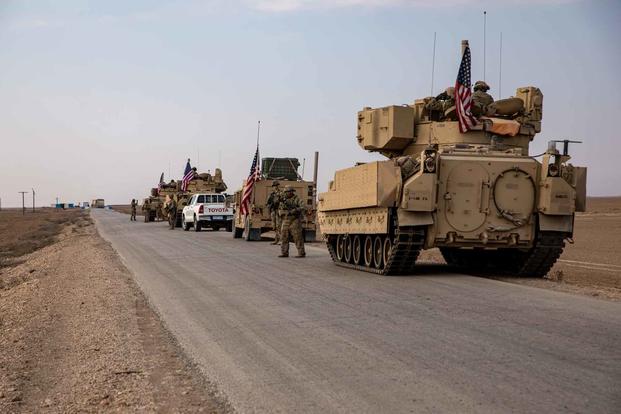At least 66 American service members in Iraq and Syria have been injured in a barrage of recent attacks by Iran-backed militants, though only a handful of troops have so far received Purple Hearts, according to the services.
Five Purple Hearts have been awarded, three for the Army and two for the Marine Corps, while the other services have not doled out any, spokespersons for each branch said. No details on the specific injuries were released, though many of the wounds recently inflicted on troops are believed to be traumatic brain injuries.
As of Oct. 26, at least 19 service members had suffered TBIs as militants have ratcheted up pressure on bases, the Pentagon announced and that count has likely risen as the spike in attacks continues in the region amid the Israel-Hamas war in Gaza.
U.S. and coalition forces have been attacked 97 times since Oct. 17, a defense official told Military.com on Thursday. Of those, 45 attacks were against bases in Iraq, including Al Asad Air Base, and 52 in Syria where the U.S. has a garrison at al-Tanf. Those incidents consisted of one-way attack drones, rockets and ballistic missiles, some of which failed to hit their intended targets due to a series of counter-defenses.
The Air Force, Navy and Space Force said they have not awarded any Purple Hearts. It was unknown whether any service members in those branches have been injured.
It's also unclear why so few Purple Hearts have been awarded to troops injured in the recent string of attacks by Iran proxy groups, which have long harassed the U.S. forces who remain in the region to fight the remnants of the Islamic State terrorist group. Head injuries are a signature injury of 21st-century wars and can often be severe for the long-term health of service members.
The Army in 2011 clarified its policy that TBIs are indeed legitimate combat wounds and thus affected soldiers are entitled to Purple Hearts. The other services have similar policies, noting that the award is to be given to troops if the injury requires being seen by a medical official.
The head injuries can lead to fatigue, severe headaches, irritability, loss of vision, difficulties with memory, personality disorders and other mental health issues, and can be linked to suicide. Symptoms may be identified immediately or take years to manifest.
Furthermore, Purple Hearts are not just another military accolade; they can be key tools when filing for disability benefits from the Department of Veterans Affairs.
In years past, awards have sometimes been kept from injured troops when officials dismissed the severity of the wounds. In 2020, then-President Donald Trump downplayed injuries after an Iranian missile barrage against Al Asad in which 109 troops were eventually diagnosed with traumatic brain injury.
"I heard they had headaches and a couple of other things," Trump told reporters at the time. "But I would say, and I can report, it is not very serious. Not very serious."
After those remarks, many troops, particularly National Guardsmen, waited two years to be awarded their Purple Hearts.
But dismissing such injuries goes back even further.
In 2008, then-Army Brig. Gen. Joseph Caravalho, a senior medical officer at the time in Iraq, issued a memo that discouraged awarding Purple Hearts when soldiers required only "minimum medical intervention."
The Army's policy says the award is given when a soldier is injured by enemy weapons regardless of the level of treatment those injuries warrant.












